黑龙江省哈三中2018-2019学年高一上学期期中考试英语试题 Word版含答案
黑龙江省哈尔滨市第三中学近年届高三英语上学期期中试题(含解析)(最新整理)
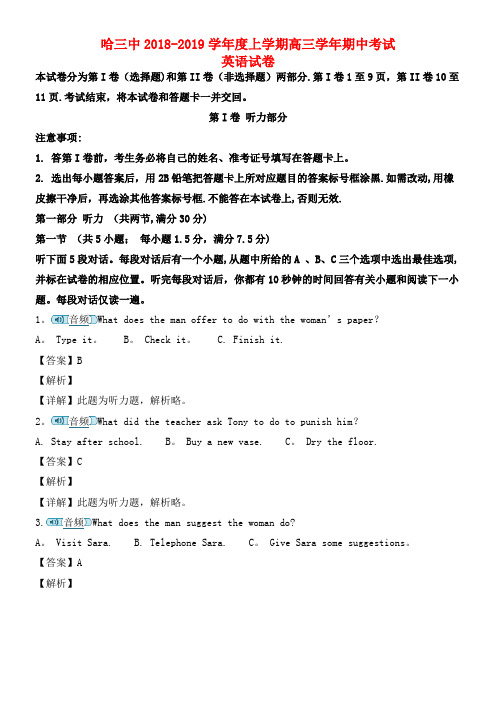
哈三中2018-2019学年度上学期高三学年期中考试英语试卷本试卷分为第I卷(选择题)和第II卷(非选择题)两部分.第I卷1至9页,第II卷10至11页.考试结束,将本试卷和答题卡一并交回。
第I卷听力部分注意事项:1. 答第I卷前,考生务必将自己的姓名、准考证号填写在答题卡上。
2. 选出每小题答案后,用2B铅笔把答题卡上所对应题目的答案标号框涂黑.如需改动,用橡皮擦干净后,再选涂其他答案标号框.不能答在本试卷上,否则无效.第一部分听力(共两节,满分30分)第一节(共5小题;每小题1.5分,满分7.5分)听下面5段对话。
每段对话后有一个小题,从题中所给的A 、B、C三个选项中选出最佳选项,并标在试卷的相应位置。
听完每段对话后,你都有10秒钟的时间回答有关小题和阅读下一小题。
每段对话仅读一遍。
1。
音频What does the man offer to do with the woman’s paper?A。
Type it。
B。
Check it。
C. Finish it.【答案】B【解析】【详解】此题为听力题,解析略。
2。
音频What did the teacher ask Tony to do to punish him?A. Stay after school. B。
Buy a new vase. C。
Dry the floor.【答案】C【解析】【详解】此题为听力题,解析略。
3.音频What does the man suggest the woman do?A。
Visit Sara. B. Telephone Sara. C。
Give Sara some suggestions。
【答案】A【解析】【详解】此题为听力题,解析略.4.音频What does the woman mean?A。
She will book the dictionary for the man.B. She didn’t accept special orders this week。
黑龙江省哈尔滨市第三中学校2019届高三上学期第二次调研考试英语试题含答案
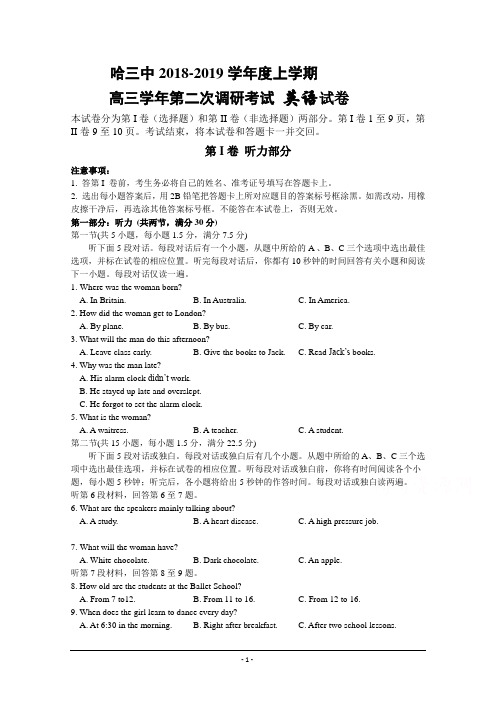
哈三中2018-2019学年度上学期高三学年第二次调研考试英语试卷本试卷分为第I卷(选择题)和第II卷(非选择题)两部分。
第I卷1至9页,第II卷9至10页。
考试结束,将本试卷和答题卡一并交回。
第I卷听力部分注意事项:1. 答第I 卷前,考生务必将自己的姓名、准考证号填写在答题卡上。
2. 选出每小题答案后,用2B铅笔把答题卡上所对应题目的答案标号框涂黑。
如需改动,用橡皮擦干净后,再选涂其他答案标号框。
不能答在本试卷上,否则无效。
第一部分:听力(共两节,满分30分)第一节(共5小题,每小题1.5分,满分7.5分)听下面5段对话。
每段对话后有一个小题,从题中所给的A 、B、C三个选项中选出最佳选项,并标在试卷的相应位置。
听完每段对话后,你都有10秒钟的时间回答有关小题和阅读下一小题。
每段对话仅读一遍。
1.Where was the woman born?A. In Britain.B. In Australia.C. In America.2. How did the woman get to London?A. By plane.B. By bus.C. By car.3. What will the man do this afternoon?A. Leave class early.B. Give the books to Jack.C. Read Jack’s books.4. Why was the man late?A. His alarm clock didn’t work.B. He stayed up late and overslept.C. He forgot to set the alarm clock.5. What is the woman?A. A waitress.B. A teacher.C. A student.第二节(共15小题,每小题1.5分,满分22.5分)听下面5段对话或独白。
【期中试卷】黑龙江省哈尔滨市第三中学2017-2018学年高一上学期期中考试英语试题(含答案)

哈三中2017-2018学年度上学期高一学年第一模块考试英语试卷第一部分听力做题时,先将答案标在试卷上。
录音内容结束后,你将有两分钟的时间将试卷上的答案转涂到答题卡上。
第一节:共5小题;每小题1分,满分5分。
听下面5段对话。
每段对话后有一个小题,从题中给出的A, B, C三个选项中选出最佳选项,并标在试卷的相应位置。
听完每段对话后,你都有10秒钟的时间回答有关小题和阅读下一小题。
每段对话仅读一遍。
1. How long does it take the man to drive to the university during rush hour?A. 25 minutes.B. 30 minutes.C. 50 minutes.2. Where does this conversation take place?A. In a hotel.B. In a restaurant.C. In a bank.3. What should the man do next?A. Prepare for the meeting.B. Make a phone call.C. Visit Dr. Carton.4. What does the woman mean?A. Stacey is kind.B. Nobody can replace Stacey.C. The work is tough to do.5. What’s the man’s trouble?A. He had a bad meal.B. He received a wrong bill.C. He couldn’t find the hotel.第二节:共15小题;每小题1分,满分15分。
听下面5 段对话或独白。
每段对话或独白后有几个小题,从题中所给的A, B, C三个选项中选出最佳选项,并标在试卷的相应位置。
听每段对话或独白前,你将有时间阅读各个小题,每小题5秒钟;听完后,各小题将给出5秒钟的作答时间。
黑龙江省哈尔滨市第三中学校2018-2019学年高一下学期期中考试英语试题(含答案)
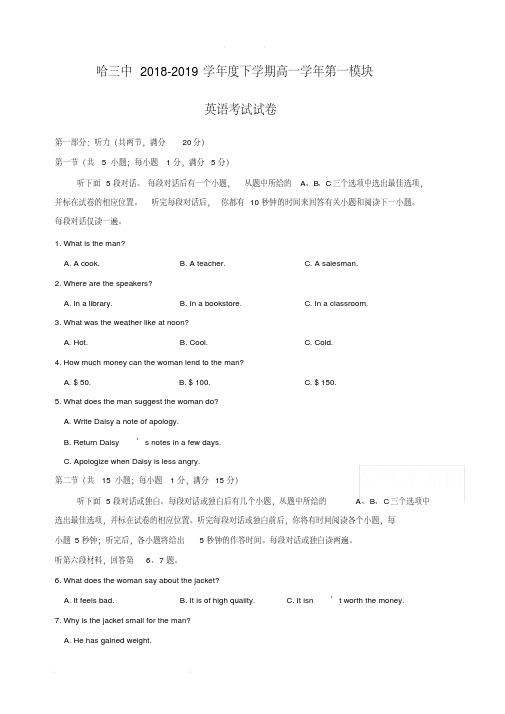
哈三中2018-2019学年度下学期高一学年第一模块英语考试试卷第一部分:听力(共两节,满分20分)第一节(共 5 小题;每小题1分,满分5分)听下面5段对话。
每段对话后有一个小题,从题中所给的A、B、C三个选项中选出最佳选项,并标在试卷的相应位置。
听完每段对话后,你都有10秒钟的时间来回答有关小题和阅读下一小题。
每段对话仅读一遍。
1. What is the man?A. A cook.B. A teacher.C. A salesman.2. Where are the speakers?A. In a library.B. In a bookstore.C. In a classroom.3. What was the weather like at noon?A. Hot.B. Cool.C. Cold.4. How much money can the woman lend to the man?A. $ 50.B. $ 100.C. $ 150.5. What does the man suggest the woman do?A. Write Daisy a note of apology.B. Return Daisy’s notes in a few days.C. Apologize when Daisy is less angry.第二节(共15 小题;每小题1分,满分15分)听下面5段对话或独白。
每段对话或独白后有几个小题,从题中所给的A、B、C三个选项中选出最佳选项,并标在试卷的相应位置。
听完每段对话或独白前后,你将有时间阅读各个小题,每小题5秒钟;听完后,各小题将给出5秒钟的作答时间。
每段对话或独白读两遍。
听第六段材料,回答第6、7题。
6. What does the woman say about the jacket?A. It feels bad.B. It is of high quality.C. It isn’t worth the money.7. Why is the jacket small for the man?A. He has gained weight.B. He bought a wrong size.C. He likes to wear a small size.听第7段材料,回答第8、9题。
黑龙江省哈尔滨三中上学期高一期中试题(全科9套)PDF版
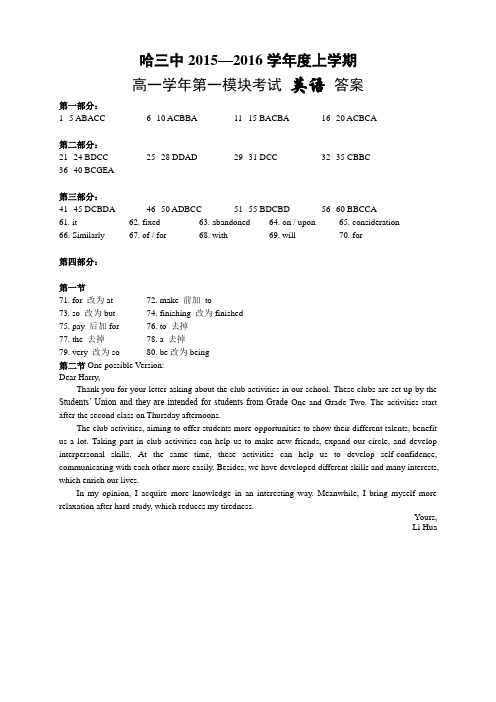
哈三中2015—2016学年度上学期高一学年第一模块考试英语答案第一部分:1--5 ABACC 6--10 ACBBA 11--15 BACBA 16--20 ACBCA第二部分:21--24 BDCC 25--28 DDAD 29--31 DCC 32--35 CBBC36--40 BCGEA第三部分:41--45 DCBDA 46--50 ADBCC 51--55 BDCBD 56--60 BBCCA61. it 62. fixed 63. abandoned 64. on / upon 65. consideration66. Similarly 67. of / for 68. with 69. will 70. for第四部分:第一节71. for 改为at 72. make 前加to73. so 改为but 74. finishing 改为finished75. pay 后加for 76. to 去掉77. the 去掉78. a 去掉79. very 改为so 80. be改为being第二节One possible Version:Dear Harry,Thank you for your letter asking about the club activities in our school. These clubs are set up by the Students’ Union and they are intended for students from Grade One and Grade Two. The activities start after the second class on Thursday afternoons.The club activities, aiming to offer students more opportunities to show their different talents, benefit us a lot. Taking part in club activities can help us to make new friends, expand our circle, and develop interpersonal skills. At the same time, these activities can help us to develop self-confidence, communicating with each other more easily. Besides, we have developed different skills and many interests, which enrich our lives.In my opinion, I acquire more knowledge in an interesting way. Meanwhile, I bring myself more relaxation after hard study, which reduces my tiredness.Yours,Li Hua。
黑龙江省哈三中高一上学期期中考试 英语
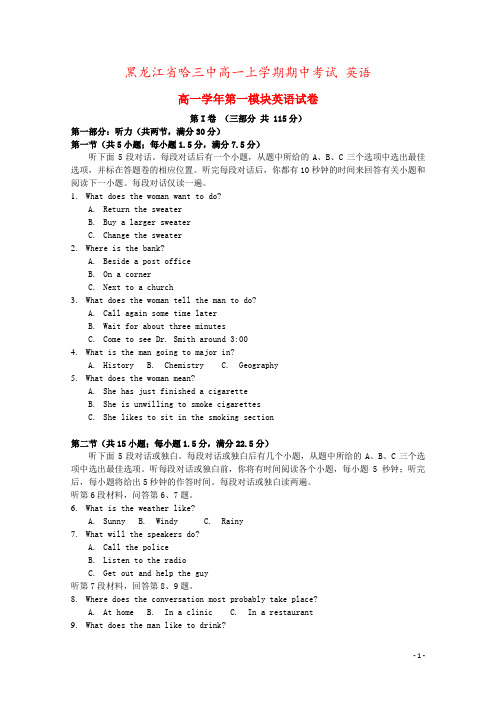
黑龙江省哈三中高一上学期期中考试英语高一学年第一模块英语试卷第I卷(三部分共 115分)第一部分:听力(共两节,满分30分)第一节(共5小题;每小题1.5分,满分7.5分)听下面5段对话。
每段对话后有一个小题,从题中所给的A、B、C三个选项中选出最佳选项,并标在答题卷的相应位置。
听完每段对话后,你都有10秒钟的时间来回答有关小题和阅读下一小题。
每段对话仅读一遍。
1.What does the woman want to do?A.Return the sweaterB.Buy a larger sweaterC.Change the sweater2.Where is the bank?A.Beside a post officeB.On a cornerC.Next to a church3.What does the woman tell the man to do?A.Call again some time laterB.Wait for about three minutese to see Dr. Smith around 3:004.What is the man going to major in?A.HistoryB. ChemistryC. Geography5.What does the woman mean?A.She has just finished a cigaretteB.She is unwilling to smoke cigarettesC.She likes to sit in the smoking section第二节(共15小题;每小题1.5分,满分22.5分)听下面5段对话或独白。
每段对话或独白后有几个小题,从题中所给的A、B、C三个选项中选出最佳选项。
听每段对话或独白前,你将有时间阅读各个小题,每小题5秒钟;听完后,每小题将给出5秒钟的作答时间。
黑龙江省实验中学2018-2019学年高一上学期期中考试英语---精校解析Word版
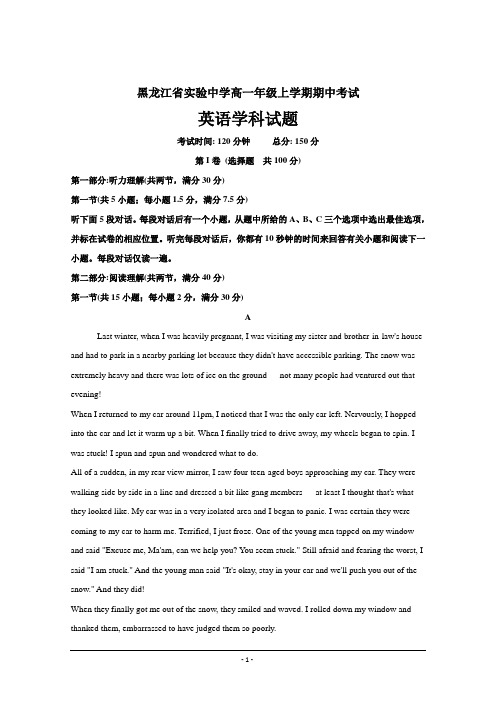
黑龙江省实验中学高一年级上学期期中考试英语学科试题考试时间: 120分钟总分: 150分第I卷(选择题共100分)第一部分:听力理解(共两节,满分30分)第一节(共5小题;每小题1.5分,满分7.5分)听下面5段对话。
每段对话后有一个小题,从题中所给的A、B、C三个选项中选出最佳选项,并标在试卷的相应位置。
听完每段对话后,你都有10秒钟的时间来回答有关小题和阅读下一小题。
每段对话仅读一遍。
第二部分:阅读理解(共两节,满分40分)第一节(共15小题;每小题2分,满分30分)ALast winter, when I was heavily pregnant, I was visiting my sister and brother-in-law's house and had to park in a nearby parking lot because they didn't have accessible parking. The snow was extremely heavy and there was lots of ice on the ground --- not many people had ventured out that evening!When I returned to my car around 11pm, I noticed that I was the only car left. Nervously, I hopped into the car and let it warm up a bit. When I finally tried to drive away, my wheels began to spin. I was stuck! I spun and spun and wondered what to do.All of a sudden, in my rear view mirror, I saw four teen-aged boys approaching my car. They were walking side by side in a line and dressed a bit like gang members --- at least I thought that's what they looked like. My car was in a very isolated area and I began to panic. I was certain they were coming to my car to harm me. Terrified, I just froze. One of the young men tapped on my window and said "Excuse me, Ma'am, can we help you? You seem stuck." Still afraid and fearing the worst, I said "I am stuck." And the young man said "It's okay, stay in your car and we'll push you out of the snow." And they did!When they finally got me out of the snow, they smiled and waved. I rolled down my window and thanked them, embarrassed to have judged them so poorly.21. Why did the author just freeze when the four young men walking toward her car?A. Because she was afraid of being harmed.B. Because she sat in her car for too long a time.C. Because she was cold indeed in that freezing evening.D. Because she knew they would rob her of the car.22. Which of the following words can best describe the four young men?A. Impolite.B. Ill-mannered.C. UnfriendlyD. Warm-hearted.23. Which of the following is TRUE according to the text?A. One of the four teenagers was a gang member.B. The kids wanted to help the author out of trouble.C. The author would have a baby in her car.D. The young men enjoyed pushing cars out of the snow.24. The best title for the text would be___________.A. Every man has his faultsB. Fortune favors those who use their judgmentC. Don't judge a book by its coverD. Think twice before you do.【答案】21. A 22. D 23. B 24. C【解析】试题分析:这篇文章讲述作者被困在雪中,看见几个年轻人到来,作者从他们的样子看因为他们是要伤害她,但是几个年轻人却帮助作者摆脱困境。
黑龙江省哈尔滨市第三中学校2018_2019学年高一英语上学期期中试题

黑龙江省哈尔滨市第三中学校2018-2019学年高一英语上学期期中试题第一部分听力做题时,先将答案标在试卷上。
录音内容结束后,你将有两分钟的时间将试卷上的答案转涂到答题卡上。
第一节:共5小题;每小题1分,满分5分。
听下面5段对话。
每段对话后有一个小题,从题中给出的A, B, C三个选项中选出最佳选项,并标在试卷的相应位置。
听完每段对话后,你都有10秒钟的时间回答有关小题和阅读下一小题。
每段对话仅读一遍。
1. What does the woman think of the fashion show?A. Terrible.B. Disappointing.C. Wonderful.2. What will the man do this evening?A. Have some coffee.B. Go to the airport.C. Watch a film.3. What kind of music does the man like better?A. Light music.B. Rock music.C. Jazz music.4. Where are the speakers?A. At a hotel.B. In the street.C. At a hospital.5. What will the man do today?A. Play football.B. Buy some flowers.C. Work in the garden.第二节:共15小题;每小题1分,满分15分。
听下面5 段对话或独白。
每段对话或独白后有几个小题,从题中所给的A, B, C三个选项中选出最佳选项,并标在试卷的相应位置。
听每段对话或独白前,你将有时间阅读各个小题,每小题5秒钟;听完后,各小题将给出5秒钟的作答时间。
每段对话或独白读两遍。
听第6段材料,回答第6至7题。
6. What can the woman take home?A. Some novels.B. Some dictionaries.C. Some textbooks.7. Where can the woman have a rest?A. By the window.B. Near the door.C. Behind the computers.听第7段材料,回答第8至9题。
- 1、下载文档前请自行甄别文档内容的完整性,平台不提供额外的编辑、内容补充、找答案等附加服务。
- 2、"仅部分预览"的文档,不可在线预览部分如存在完整性等问题,可反馈申请退款(可完整预览的文档不适用该条件!)。
- 3、如文档侵犯您的权益,请联系客服反馈,我们会尽快为您处理(人工客服工作时间:9:00-18:30)。
哈三中2018—2019学年度上学期高一学年第一模块英语考试试卷第一部分听力做题时,先将答案标在试卷上。
录音内容结束后,你将有两分钟的时间将试卷上的答案转涂到答题卡上。
第一节:共5小题;每小题1分,满分5分。
听下面5段对话。
每段对话后有一个小题,从题中给出的A, B, C三个选项中选出最佳选项,并标在试卷的相应位置。
听完每段对话后,你都有10秒钟的时间回答有关小题和阅读下一小题。
每段对话仅读一遍。
1. What does the woman think of the fashion show?A. Terrible.B. Disappointing.C. Wonderful.2. What will the man do this evening?A. Have some coffee.B. Go to the airport.C. Watch a film.3. What kind of music does the man like better?A. Light music.B. Rock music.C. Jazz music.4. Where are the speakers?A. At a hotel.B. In the street.C. At a hospital.5. What will the man do today?A. Play football.B. Buy some flowers.C. Work in the garden.第二节:共15小题;每小题1分,满分15分。
听下面5 段对话或独白。
每段对话或独白后有几个小题,从题中所给的A, B, C三个选项中选出最佳选项,并标在试卷的相应位置。
听每段对话或独白前,你将有时间阅读各个小题,每小题5秒钟;听完后,各小题将给出5秒钟的作答时间。
每段对话或独白读两遍。
听第6段材料,回答第6至7题。
6. What can the woman take home?A. Some novels.B. Some dictionaries.C. Some textbooks.7. Where can the woman have a rest?A. By the window.B. Near the door.C. Behind the computers.听第7段材料,回答第8至9题。
8. Who is the woman with?A. Her sisters.B. Her cousins.C. Her friends.9. What kind of room does the man suggest?A. A family suite (套房).B. A single room.C. A double room.听第8段材料,回答第10至12题10. How is Ted’s work this time?A. Very poor.B. Well done.C. So-so.11. Where is Ted going now?A. The gym.B. The library.C. The bookstore.12. What is the relationship between the speakers?A. Boss and secretary.B. Mother and son.C. Teacher and student.听第9段材料,回答第13至16题。
13. Where did Jason get to know Mary?A. At a party.B. At a cinema.C. At a restaurant.14. How will Mary’s mother come over?A. By bus.B. By air.C. By train.15. When will the speakers go to the concert?A. On Tuesday.B. On Friday.C. On Saturday.16. What can we learn from the conversation?A. The speakers are students.B. Mary can play the piano.C. The con cert starts at eight o’clock.听第10段材料,回答第17至20题。
17. Whose birthday is coming?A. Julia.B. Susan.C. Jane.18. When does the speaker think the party can start?A. At 5:00 pm.B. At 5:30 pm.C. At 6:30 pm.19. Where is the restaurant?A. Near a supermarket.B. Near a post office.C. Near a hotel.20. Why will the speaker get to the restaurant ahead of time?A. To decorate the room.B. To organize the food.C. To book a room.第二部分阅读理解第一节:共15小题;每小题2分,满分30分阅读下列短文,从每题所给的四个选项(A、B、C和D)中,选出最佳选项,并在答题卡上将该项涂黑.AWe spent a day in the country picking wild flowers. Our car looked like a flower shop inside! On the way home, we had to stop at traffic lights, and then my wife noticed the cupboard.It was tall and narrow, and it stood outside a furniture (家具) shop. “Buy it,” she said at once. “We’ll carry it home on the roof-rack (车顶架). I’ve always wanted one like that.”What could I do? Ten minutes later I was twenty dollars poorer, and the cupboard was tied on to the roof-rack. The police even stopped traffic to let us through. Carrying furniture was a good idea. After a minute my wife said, “There’s a long line of cars behind.Why don’t they overtake (超车)?”In fact a police car did overtake. The two officers (警官) inside looked at us seriously as they passed. But then with great kindness, they led us through the busy traffic. The police car stopped at our village church (教堂).I was puzzled. “Thanks, officer,” I said. “You’ve been very kind. I live just down the road.”He was looking at our things: first at the flowers, and then at the cupboard. “Well, well,” he said and laughed. “It’s a cupboard you’ve got there! We thought it was… er, something else.”My wife began to laugh. Then the truth struck me immediately. I smiled at the officer, “Yes, it’s a cupboard, but thanks again.” I drove home as fast as I could.21. The write wrote this story in order to ________.A. praise the police officerB. thank the other driversC. show people are kind to each otherD. tell us their funny experience22. The writer stopped his car on the way home ________.A. to buy a cupboardB. to pick wild flowersC. to have a chat with a policemanD. to sell the flowers23. The drivers behind didn’t overtake because ________.A. they wanted to show their special kindnessB. they were afraid the cupboard would fall downC. they were admiring the flowers in the writer’s carD. they wondered what was inside the cupboard24. The writer’s wife began to laugh because _______.A. she thought the police officers were enthusiasticB. she was interested in what the police officers saidC. she was glad they were treated kindlyD. she had realized the truth25. As a matter of fact, the police _______.A. failed to help the writerB. did help the writerC. got the writer into troubleD. make the writer angryBGesture is the use of such movements to express thought, emotion, etc. A gesture can be many things. Slamming a book or shutting a door shows anger and frustration. Opening a door for someone shows kindness. Gestures go much beyond small actions.My friend once told me a story in high school. One day he met a girl who was on the girls’ basketball team. He said hello, gave her a hard handshake and wished her good luck as she had a game later. He came to find out he saved that girl’s life. She had planned on committing suicide and by shaking her hand and saying good luck, he made her realize someone really cared about her. I’m not saying all actions are going to change someone else’s life that m uch, but it may make their day better.Gestures can be negative too. In my senior year of high school, a guy on my football team was late and was walking down the field to practice. Everyone on the team knows our coach hates it when people are late and walk on the field. He was walking in as if he owned the place and had no care of what his teammates were thinking. His body language had never been good. The other players on the team had never liked him because of his body language.Gestures can often say more than a person wants. One day I was mad at my parentsfor some pointless reason. All day I stayed downstairs. When one of them walked by, I would just stare at the TV or my phone and hope they wouldn’t try to start a conversation. When they tried to talk to me, I would give one-word answers. Sitting on the couch and watching TV by myself all day was not my intention, but that was what my gestures told my parents.One simple gesture can change a person’s thoughts or day or maybe even save their lives. If everyone made a nice gesture to someone else every day, our school, town, and world would become a better place. One single act of random kindness ata time or a kind gesture can change the world.26. The underlined word “slamming” in paragraph 1 probably means .A. close violentlyB. read aloudC. write gentlyD. forget completely27. The story in paragraph 2 shows _____________.A. gestures are more important than wordsB. the girl made the writer’s friend feel warmC. the w riter’s friend had affection for the girlD. gestures may help people be positive about life28. The football team players never liked the guy because .A. he is late for practiceB. their coach hates his being lateC. he is badly-behavedD. h e pays no attention to others’ feelings29. How is the passage mainly developed?A. By making comparisons.B. By following the order of time.C. By giving examples.D. By analyzing cause and effect.30. Which is the best title for this passage?A. Words MatterB. Actions SpeakC. Kindness ShinesD. Behavior ChangesCIn an effort to control the nation’s growing problem of food wastage, the South Korean government has started a new plan —“Pay as You Trash”. Residents (居民) are required to separate their food waste from the rest of their trash and throw it separately in a centralized (集中的) bin. And in order to access the bin, they actually need to pay by the kilo!As of now, the South Korean government has three methods in place to charge citizens for the food thrown away. One is through an RFID (Radio Frequency Identification) card — when users tap this card over a specially designed food waste bin, the lid will open. This waste is automatically weighed and recorded in the user’s account. Th e user needs to settle this bill on a monthly basis.The second billing method is through pre-paid garbage bags. For instance, in Seoul, a 10-liter garbage bag costs about $1. There’s also a bar code (条形码) management system in place, in which residents throw food waste directly into composting bins (堆肥桶) and pay for it by purchasing bar code stickers attached to the bin.Nearly every suburban area in the nation is equipped with one of these three payment systems. Even before the pay-by-weight system was introduced, South Koreans were still being charged for food waste — the cost was simply divided equally among the residents of each apartment block. The new system is not only fair, but is also designed to make consumers really feel the pinch of too much waste. The more food they throw out, the more they end up paying.Citizens like Seoul housewife Ms. Kwan are now adopting creative methods to avoid food waste. She makes sure to remove all the liquid out of leftover food before throwing it away. While preparing vegetables, she tries to make use of as much the eatable parts as possible.“Because I’m worried about the fees, I’m more careful about food waste now,”she said. “Our food waste has become much less than before.”31. The centralized dustbin is used to ________.A. cut down the household rubbishB. collect the household rubbishC. keep food rubbishD. break down food rubbish32. What do we know about the three payment systems?A. A compost bin costs about $1.B. All of them can weigh the rubbish automatically.C. The pre-paid garbage bags are charged on a monthly basis.D. RFID cards can record the weight of rubbish users throw.33. Before the new plan was put forward, citizens _________.A. didn’t pay for their food wasteB. shared the waste cost equallyC. paid for their food waste by weightD. had to pay for their food garbage bags34. The underlined word “pinch” in paragraph 4 means ___________.A. burdenB. joyC. excitementD. surprise35. According to the text, “Pay as You Trash” _______________.A. is working effectivelyB. was thought to be unfair at firstC. is quite expensive to carry outD. is not accepted by residents第二节:共5小题;每小题2分,满分10分根据短文内容,从短文后的选项中选出能填入空白处的最佳选项。
